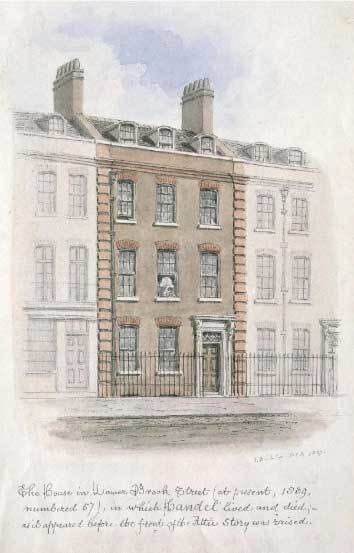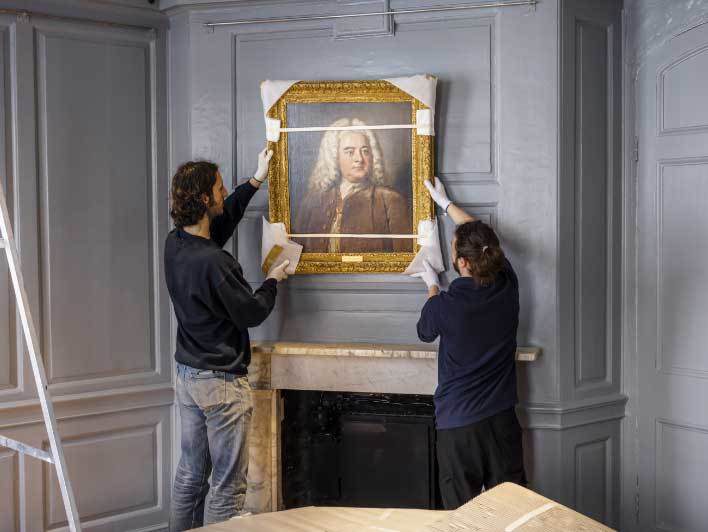SERSE (HWV 40)
Libretto: Unknown, after Silvio Stampiglia, 1694, from Niccolo Minato, 1654
First performance: 15th April 1738, King's Theatre, London
Cast
- Gaetano Majorano, called "Caffarelli" (Soprano-castrato)
- Maria Antonia Marchesini, called "La Lucchesina" (Alto)
- Antonia Maria Merighi (Contralto)
- Elisabeth Duparc, called "La Francesina" (Soprano)
- Margherita Chimenti, called "La Droghierina" (Soprano)
- Antonio Montagnana (Bass)
- Antonio Lottini (Bass)

Synopsis
The action takes place in Abydos, on the southern shore of the Hellespont.
Act I
A magnificent garden with a plane tree and a summerhouse. The Persian king Serse (Xerxes) pays affectionate tribute to the tree. As he admires it his brother Arsamene, accompanied by his servant Elviro, comes in search of his beloved Romilda. They stop at the sound of music, and Romilda, from the summerhouse, sings of Serse’s infatuation with the tree. Aroused by the sound of his own name Serse asks Arsamene about the singer: he wants her as part of his harem or, failing that, as his wife. Arsamene is horrified, but is determined that Serse shall not have her.
Arsamene warns Romilda of Serse’s intentions, thereby giving hope to Romilda’s sister Atalanta, who is secretly in love with Arsamene. Though Romilda reassures Arsamene that she will be true to him, he remains anxious, and when Serse comes to tell Romilda that he wants her as his queen Arsamene steps forward to intervene, and is banished from the court. Serse tries, unsuccessfully, to convince Romilda of his love; she is determined not to betray her love for Arsamene.
In a courtyard outside the palace Amastre, a princess promised in marriage to Serse, arrives disguised as a man. Serse’s victorious army now returns from war against the Mauri, led by Serse’s general Ariodate, father of Romilda and Atalanta. Serse congratulates Ariodate and promises him, as a reward, that his daughter Romilda shall have a royal husband, ‘equal in status to Serse’. Ariodate is delighted. Serse muses on his love for Romilda, and how Amastre and her father will react to the news that he is taking a vassal as a wife. Amastre, incensed at what she hears, nearly gives herself away.
Arsamene gives a letter to Elviro to deliver to Romilda, in which he promises to visit her secretly. Amastre, alone, determines furiously to have her revenge on Serse. Atalanta taunts her sister, telling her that Arsamene loves another woman, but Romilda is not fooled. Atalanta realises that she will need to employ her full repertoire of coquetry to secure Arsamene for herself.

Act II
A public square. Elviro has disguised himself as a flower-seller to convey the letter to Romilda, but is concerned that she will soon be Serse’s wife. Amastre overhears and questions Elviro about the king’s forthcoming marriage. She realises in despair that her last hope is gone. Atalanta arrives and Elviro makes himself known to her and explains his mission; she promises to deliver the letter and takes it from him, telling Elviro that Romilda has forgotten Arsamene and is in love with Serse. Atalanta now shows the letter to Serse, but claims that it is addressed to her, and that Arsamene’s love for Romilda was feigned. The news gives Serse hope and he takes the letter to Romilda, telling her that Arsamene loves her sister. She insists that she still loves him, though once alone she falls prey to jealousy.
Amastre has decided to kill herself. Elviro stops her and she determines to confront Serse with his treachery before she dies. Elviro tells his master that Romilda is in love with the king; Arsamene is heart-broken.
Serse’s forces have completed a bridge across the Hellespont, joining Asia and Europe. Sailors praise the enterprise as Serse instructs Ariodate to advance across into Europe. Serse consoles the doleful Arsamene with the news that he shall have the wife he wants – Atalanta; Serse will marry Romilda. Arsamene, confused, insists that it is Romilda he loves; and that he is determined to win her. Serse advises Atalanta to forget her love for Arsamene , but she admits that she cannot. Elviro, searching for his master on the sea shore, watches as a storm brews which threatens to destroy the bridge.
In a garden near the city Serse and Amastre, each lost in thought, lament the miseries of jealousy. When Serse attempts, again, to persuade Romilda to marry him, Amastre intervenes with drawn sword. Serse calls his guards, but Romilda dismisses them and asks Amastre why she leapt to her defense. Amastre explains that she was saving Romilda from being forced into a match against her will. Romilda pays glowing tribute to those true in love.

Act III
In a gallery, Arsamene and Romilda are quarelling over the letter, but are quickly reconciled when Atalanta explains her deceit. Atalanta resigns herself to finding a lover elsewhere. Serse approaches and Arsamene hides. With veiled threats Serse now presses Romilda to accept him, and in desperation she agrees if her father will grant his consent to their marriage. Serse leaves to speak to Ariodate; Arsamene, emerging from hiding, accusses Romilda bitterly of betraying him.
Serse repeats to Arodate his promise that a man his own equal in rank shall be Romilda’s husband. Ariodate, highly honoured, imagines Serse to mean Arsamene and readily agrees. Serse returns triumphantly to Romilda, addrssing her as his queen, but to stall him she now confesses that Arsamene has kissed her; Serse’s furious reaction is to dispatch guards to kill Arsamene. Romilda asks Amastre to warn Arsamene that he is in danger; in return Amastre asks Romilda to convey a letter of her own to the king. Arsamene believes that the death threats are a ruse to be rid of him and he and Romilda quarrel again.
In the great temple of the sun Ariodate greets Romilda and Arsamene – still bickering – with the astonishing news that they are to be married immediately by Serse’s decree. Ariodate joins their hands in marriage, then hurries back to Serse to thank him. When Serse understands what has happened he turns on the quaking Ariodate in fury. A page now brings the letter, apparently from Romilda, accusing Serse of treachery; learning that it is from Amastre he explodes with rage and rushes from the room, to be met by Romilda, Arsamene and Amastre. Serse orders Arsamene to kill Romilda, but Amastre intervenes and takes Serse’s sword; if a traitor in love is to be punished, she will carry out the punishment. She turns the sword on Serse, and reveals her identity. Serse is humbled, and they are reconciled. Serse blesses the union of Romilda and Arsamene and begs forgiveness for his tyrranical behaviour.
Context
Handel started work on the score of Serse on Monday 26th December 1737, just two days after completing Faramondo’ The autograph score shows that he originally dated the first page 25th December, but this was subsequently crossed out. The full score was not finished until 14th February 1738, an unusually long time for one of his operas, but perhaps the rehearsals for Faramondo which opened on 3rd January, interrupted his progress.
Serse is unusual in many ways, as Handel looked back in his selection of libretto to a 17th-century source and carried over many of the conventions of that period into his new work. The librettos of Metastasio and other 18th-century writers had moved away from the inclusion of comic characters toward more noble and serious characterisations. But the libretto for Serse re-introduced in Elviro the traditional low-life comic characters that early Italian operas had inherited from the commedia dell’arte tradition. Handel worked closely from a version of the earlier Serse libretto that had been set by Bononcini in 1694, borrowing not only the dramatic structure but also some thematic elements from Bononcini’s score.
The result is a unique opera in the Handel cannon, which skillfully blends comic and tragic elements, and consistently disrupts the familiar patterns of the ‘da capo’ aria that had for so long been at the heart of his stage works. Instead, he favours short tuneful arias without ‘da capo’ repeats, woven into brief recitative and ensemble sections, and counterpointed by instrumental embellishments. The comic element is introduced from the opening aria – Serse’s famous ‘Ombra mai fu’ which has become Handel’s most famous opera tune. The familiarity of the aria might distract listeners today from the absurdity of the situation, as Serse praises the shade provided by a plane tree in the most earnest and ardent terms. Handel’s ironic counterpoint of the comic situation with one of his most profound melodies is a fine example of the opportunity given to him in this opera to indulge ‘his native love and genius for humour’, as Charles Burney put it. Prophetically, Burney also identified the melody as ‘in a clear and majestic style, out of the reach of time and fashion.’
Despite this new turn in Handel’s approach to opera, Serse was not well received and ran for only five performances. It was never revived in his lifetime.
Although his fortunes in the opera house might have been waning, Handel’s fame and popularity were as strong as ever. Three days after the first performance of Serse the following notice appeared in the London Daily Post:
‘We are informed from very good Authority; that there is now near finished a Statue of the justly celebrated Mr. Handel, exquisitely done by the ingenious Mr. Raubillac…out of one entire Block of white Marble, which is to be placed in a grand Nich, erected on Purpose in the great Grove at Vaux-hall-Gardens, at the sole Expence of Mr. Tyers, Undertaker of the Entertainment there; who in Consideration of the real Merit of that inimitable Master, thought it proper, that his Effigies should preside there, where his Harmony has so often charm’d even the greatest Crouds into the profoundest Calm and most decent Behaviour…’
The statue was an extraordinary honour – Handel was the first artist in England to be portrayed in stone in this way, and when the finished work was first seen by the public on 2nd May 1738 the sculptor Roubiliac became an overnight success. The statue survives to the present day, and can be seen in the British Galleries in the Victoria and Albert Museum.


